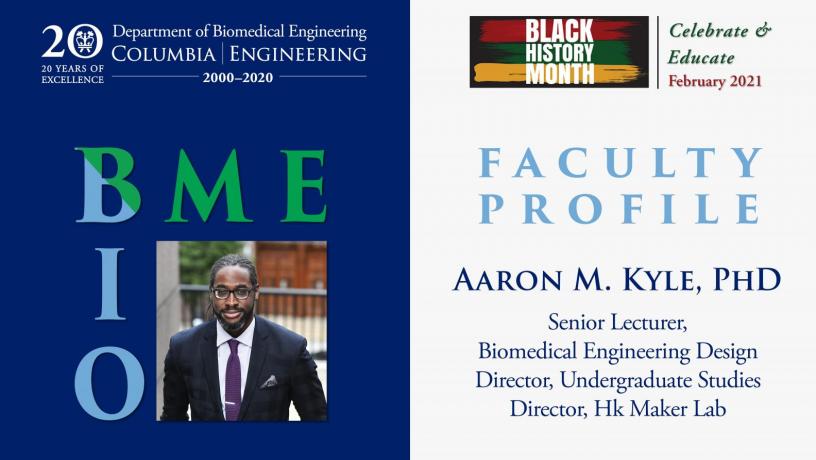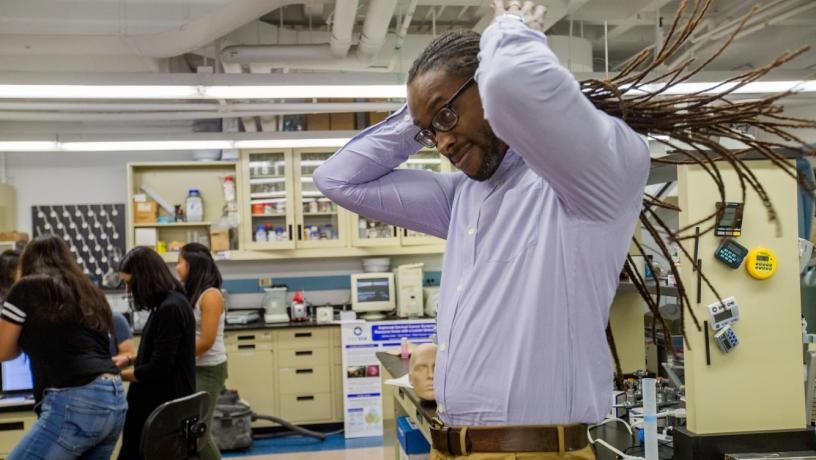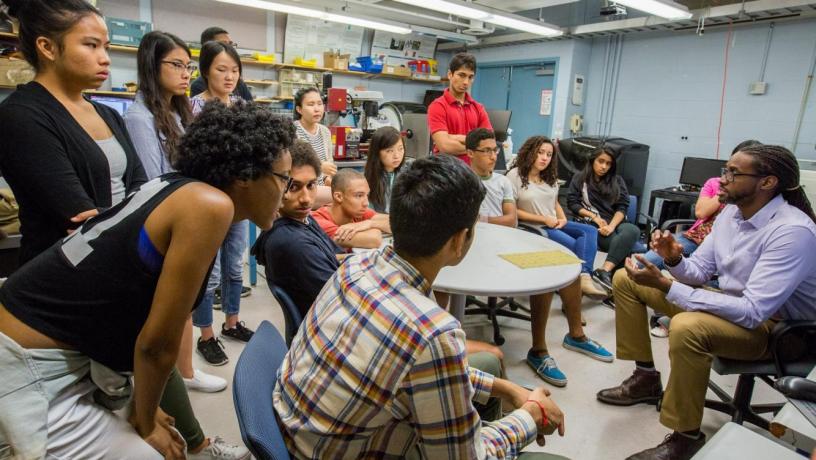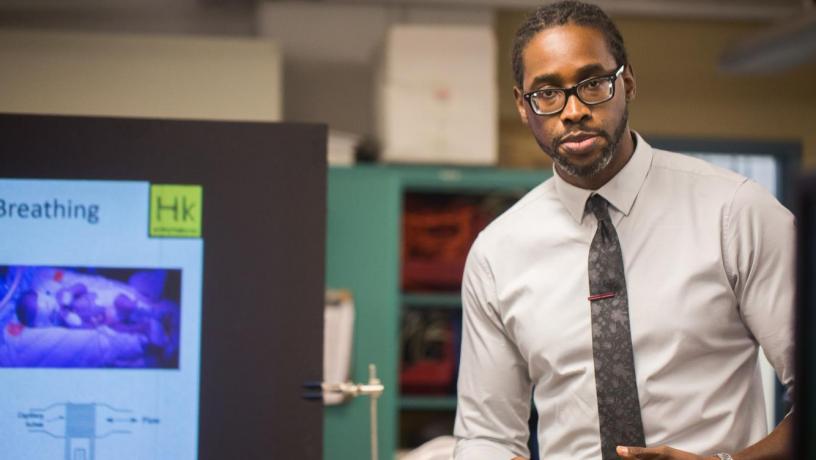BME BIO: Aaron M. Kyle, PhD
In honor of Black History Month, get to know our exceptional BME faculty, students, staff, and alumni.
Diversity, Equity & Inclusion
I’ve seen, firsthand, the potential of Black and Brown kids whose STEM pursuits are adversely affected by being in subpar schools that are the manifestation of years of policy that hinders their aspirations. I’m actively working against this to promote STEM equity for minorities.

Image Credit: Eileen Barroso
Aaron M. Kyle, PhD
Senior Lecturer in Biomedical Engineering Design; Director, Undergraduate Studies, Columbia University
Director, Hk Maker Lab
Education
BS Electrical Engineering, ‘02, Kettering University
PhD Biomedical Engineering, ‘07, Purdue University
Noteworthy Achievements:
- 2020 BMES Diversity Lecture Award
- 2020 AIMBE College of Fellows
- 2019 Joanna Nichols Visiting Scholar at Taipei American School
- 2017 Columbia University Presidential Award for Outstanding Teaching
- 2016 Janette and Armen Avanessians Diversity Award
- 2012 Kim Award for Faculty Involvement
Where are you from?
I am from Omaha, Nebraska.
What is your current position?
I am a Senior Lecturer in Biomedical Engineering, which means that my faculty role focuses on (undergraduate) instruction. I am also founder and director of a STEM outreach program called the Hk Maker Lab. STEM education and outreach has become my area of research.
How did you become interested in STEM research and, more specifically, in biomedical engineering?
When I was a child, I loved the ‘Transformers’ cartoon show and was fascinated by the idea of creating living robots. This initially motivated my interests in science and technology. As I got older, I learned about biology and cardiac electrophysiology. The exquisite coupling between electrical and mechanical physiological events that give rise to the cardiac cycle was, and still is, incredibly interesting to me. From about the seventh grade on, I wanted to be a biomedical engineer.
Tell us about your family. Who has/have been your strongest influence(s) in life?
My parents, William & Carla Kyle, have been my strongest influence and motivators. My mother is a voracious reader, engendering a passion for reading and acquiring new knowledge that really kickstarted my academic pursuits. My father is a wonderful man, a compassionate disciplinarian, and someone who provided steadfast support for my brothers and me while we found our respective paths. He’s an exemplary father and has given me a clear role model for how to comport myself as I rear my own son.
Tell us about your experience as a Black academic professional in STEM.
I am pleased that as an academic in STEM, my career has reflected the meritocracy that is supposed to be available for all members of our society. That is, I’m confident that my blackness has not held me back from accomplishment, and it has not been the reason that I have achieved anything. I believe my achievements, and my shortcomings, are because of who I am as a student, engineer, researcher, and educator, not attributable to my race.
This is only my experience and not a subscription to a colorblind mentality, which assumes race has no effect on STEM pursuit, research, or careers. I am acutely aware of how the pernicious effects of systemic racism affects the sciences and engineering and precludes people of color from pursuing pathways in STEM. I’ve seen, firsthand, the potential of Black and Brown kids whose STEM pursuits are adversely affected by being in subpar schools that are the manifestation of years of policy that hinders their aspirations. I’m actively working against this to promote STEM equity for minorities.
What does Black History Month mean to you?
Every month is Black History Month. As a father to a young Black boy, it’s important that my son sees himself represented in both historical and contemporary contexts. Accordingly, we emphasize Black accomplishment whenever possible in my home. The reflection on Black contributions that takes place in February is important, but it’s equally critical to emphasize that Black History is American History. The lessons of Black History Month should not be compartmentalized, and definitely not reduced, but should be consistently emphasized.
What accomplishment(s) are you most proud of, and what do you hope to accomplish in the future?
I am proud that I’ve been able to play a (small) role in the education of many wonderful young people. Increasingly, I hope that I am a positive representation of Black personhood that resonates beyond my students’ relatively short time in my classes.
My most important goal going forward is being a good father to my son.
What advice would you give to your younger self?
I’d tell my younger self to relax - we’re going to be alright.

Image Credit: Timothy Lee Photography

Image Credit: Timothy Lee Photography

Image Credit: Timothy Lee Photography
